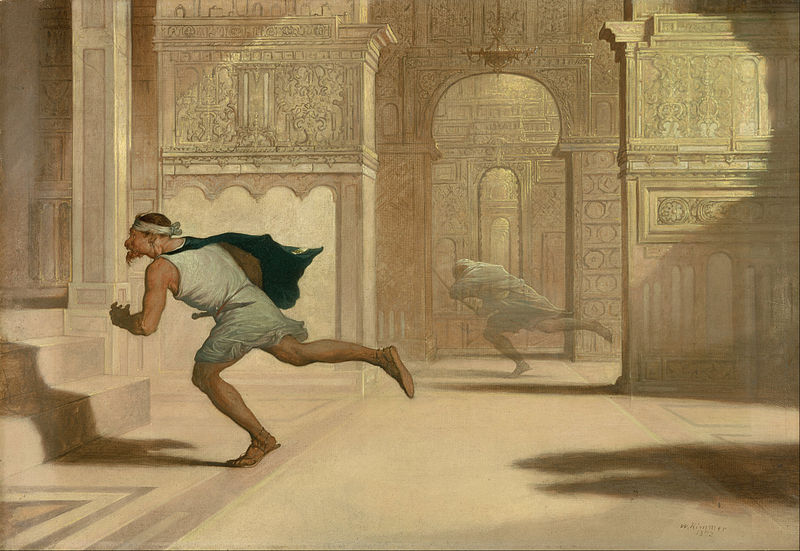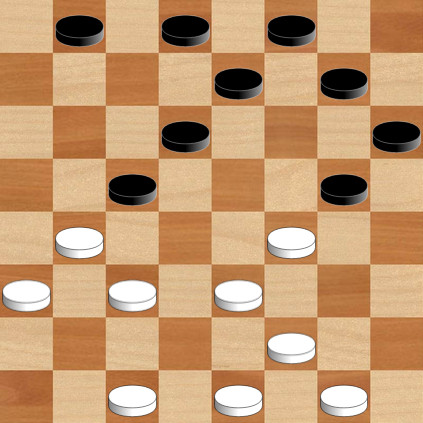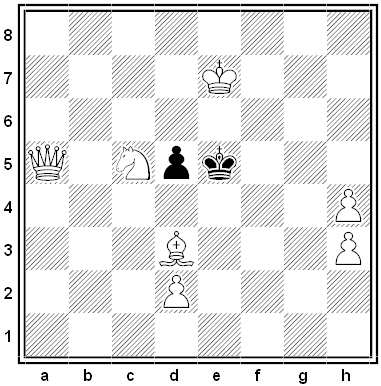Author: Greg Ross
Perspective
Artist Patrick Hughes calls this illusion “reverspective” — the “end” of each gallery hallway is actually nearest the viewer.
“Hughes acknowledges that these types of paintings have been his most successful and they continue to intrigue him,” writes Brad Honeycutt in The Art of Deception. “As such, he says that he could very well concentrate on creating paradoxical perspective pictures for the rest of his days.”
Can Do

A puzzle by Sam Loyd:
John the milkman has two 10-gallon cans full of milk. Two customers have a 5- and a 4-quart measure and want 2 quarts put into each measure. How can he accomplish this?
“It is a juggling trick pure and simple, devoid of trick or device, but it calls for much cleverness to get two exact quarts of milk into those measures employing no receptacles of any kind except the two measures and the two full cans.”
Flight and Pursuit

American painter William Rimmer produced this enigmatic image in 1872. A man runs through a palace. Is he fleeing or pursuing? What is the ghostly figure in the parallel corridor beyond him? And whose shadow is entering from the right?
No one knows. “As the title confirms, the painting turns a general situation into an ambivalent one,” writes Victor I. Stoichita in A Short History of the Shadow (1997). “There have been numerous attempts to specify its contents, but these have only resulted in the principle being misunderstood, for everything leads us to believe that it was Rimmer’s intention to create a story that functioned through its enigmatic form.”
Looking Ahead

This position is from a 1990 game between Marion Tinsley, humanity’s last checkers champion, and Chinook, the computer program that would eventually take the crown. Tinsley had black. The computer played g1-h2, and Tinsley looked up in surprise and said, “You’re going to regret that.” Programmer Jonathan Schaeffer, who was making the moves for the computer, wrote:
Being inexperienced in the ways of the great Tinsley, I sat there silently thinking, ‘What do you know? My program is searching 20 moves deep and says it has an advantage.’ Several moves later, Chinook’s assessment dropped to equality. A few moves later, it said Tinsley was better. Later Chinook said it was in trouble. Finally, things became so bad we resigned.
“In his notes to the game, Tinsley revealed that he had seen to the end of the game and knew he was going to win on move 11, one move after our mistake,” Schaeffer noted. “Chinook needed to look ahead 60 moves to know that its 10th move was a loser. In my experience with tournament chess and checker players, the sixth sense is experience. It is well-known how intensely Tinsley studied the game, analyzing anything from a Grandmaster game to a game between novices. His uncanny ability to know good from bad and safe from dangerous, is the direct result of all his hard work. Strong chess players have the same ability, but perhaps it is not quite as evident as it was with Tinsley.”
(From Richard J. Nowakowski, Games of No Chance, 1998.)
The Martians
In the first half of the 20th century, a considerable number of famous scientists emigrated from Hungary to the United States, including physicists Eugene Wigner, Edward Teller, and Dennis Gabor and mathematicians Theodore von Kármán, John von Neumann, Paul Halmos, George Pólya, and Paul Erdős. Most were Jewish refugees from Nazi Germany, but they had surprising further similarities — many had been born near Budapest, had shown an early interest in chemistry, and had studied physics at German universities before emigrating to America.
One of their number, Leo Szilard, joked that he knew the reason: They were all descended from a Martian scout force that had landed on Earth in that period. The Martians had left eventually, but not before impregnating some Earth women.
The “Martians” adopted Szilard’s name because in many ways they felt themselves to be outsiders in America: All were brilliant, spoke English with a strong accent, and came from a small little-known country.
When Enrico Fermi posed his famous paradox — if intelligent aliens are as common as we believe, why haven’t we encountered one? — Szilard answered, “They are among us — but they call themselves Hungarians.”
(Thanks, Rini.)
Stage Whiskers
In 1854 Robert Barnabas Brough wrote a one-act farce that centers on mustaches:
LOUISA. (looking at his moustache rapturously) And yours are such loves! (caressing them)
SOSKINS. (putting his hand up nervously) D—don’t pull ’em about.
LOUISA. (passionately) I wouldn’t injure a hair of them for worlds! — For they are the load-star of my existence!
SOSKINS. (aside) Ahem! (seriously, taking her hand, walking her up and down) Louisa, I fear it is the moustache and not the man you love.
LOUISA. Oh! don’t say that, Anthony — though I own it was they first won me, two months ago, when we met at the Eagle …
In the end she tells the audience, “I charge you, O women, for the love you bear to moustaches, to like this play as an advocate for their growing — and I charge you, O men, for the anxiety you have to grow moustaches … that on the hundredth night I would kiss as many of you as had beards that pleased me, moustaches that liked me, and whiskers that were dyed not.”
Observations
From the notebooks of Samuel Butler:
- “When I was a boy at school at Shrewsbury, old Mrs. Brown used to keep a tray of spoiled tarts which she sold cheaper. They most of them looked pretty right till you handled them. We are all spoiled tarts.”
- “Words are like money; there is nothing so useless, unless when in actual use.”
- “They say the test of [literary power] is whether a man can write an inscription. I say ‘Can he name a kitten?’ And by this test I am condemned, for I cannot.”
- “The extremes of vice and virtue are alike detestable; absolute virtue is as sure to kill a man as absolute vice is, let alone the dullnesses of it and the pomposities of it.”
- “When fatigued, I find it rests me to write very slowly with attention to the formation of each letter. I am often thus able to go on when I could not otherwise do so.”
- “Is life worth living? This is a question for an embryo, not for a man.”
- “When a man is in doubt about this or that in his writing, it will often guide him if he asks himself how it will tell a hundred years hence.”
- “Life is one long process of getting tired.”
- “I believe that more unhappiness comes from this source than from any other — I mean from the attempt to prolong family connection unduly and to make people hang together artificially who would never naturally do so. The mischief among the lower classes is not so great, but among the middle and upper classes it is killing a large number daily. And the old people do not really like it much better than the young.”
“The true writer will stop everywhere and anywhere to put down his notes,” he wrote, “as the true painter will stop everywhere and anywhere to sketch.”
Weather Station Kurt

In July 1977 geomorphologist Peter Johnson stumbled across an old weather station in northern Labrador. It turned out to be an automatic station that had been set up secretly by a German submarine crew in 1943 so that Germany might have notice of impending weather systems. The Allies had never discovered it and it had stood unregarded for 30 years after the war’s end.
“Weather Station Kurt” was probably designed to operate automatically for about six months, transmitting readings on temperature, wind direction, strength, and humidity every three hours until its batteries failed in the cold.
All the witnesses to its installation died when the submarine, U-537, was sunk in the Java Sea. Their work marks the only known armed German military operation on land in North America during World War II.
The station is now on display at the Canadian War Museum.
Unquote
“Many discoveries are reserved for ages still to be, when our memory shall have perished. The world is a poor affair if it do not contain matter for investigation for the whole world in every age.” — Seneca

